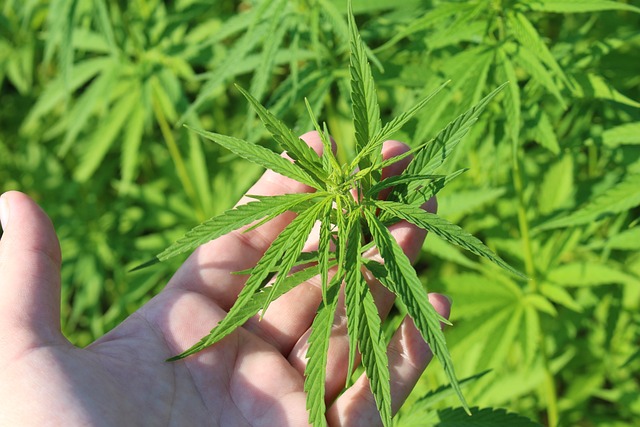THCA (tetrahydrocannabinolic acid), a non-psychoactive compound found in the Cannabis sativa plant, has been legally recognized in various forms including THCA flower within UK countries under the Misuse of Drugs Regulations 2001. This legal development is significant for those interested in exploring alternative wellness options as THCA is lauded for its potential health benefits, including anti-inflammatory, neuroprotective, and analgesic properties, which could be beneficial for managing conditions like chronic pain and multiple sclerosis. THCA, a precursor to the psychoactive THC, lacks intoxicating effects until decarboxylated. The UK's evolving stance on THCA is part of a broader conversation about the medical efficacy of cannabis derivatives and the need for informed regulation. As such, consumers are encouraged to stay updated on legislative changes and consult healthcare professionals when incorporating THCA flower into their health regimen, recognizing that scientific research continues to explore its full potential. The legal status of THCA in UK countries is a dynamic area, with the compound being one of the cannabinoids increasingly allowed under specific regulations for those seeking its therapeutic benefits.
Discover the transformative potential of THCA flower, a non-psychoactive compound garnering attention for its therapeutic properties. As we delve into the science behind this emerging wellness ingredient, we’ll explore how THCA flower fits within the legal framework of UK countries, offering insights into its health implications and ensuring compliance with regional regulations. Join us as we unravel the benefits of incorporating THCA flower into your routine, all while navigating the nuances of its legal status in the UK.
- Exploring the Therapeutic Potential of THCA Flower: Legal Insights and Benefits for UK Residents
- The Science Behind THCA Flower: Understanding Its Health Implications and Legal Status in the UK
Exploring the Therapeutic Potential of THCA Flower: Legal Insights and Benefits for UK Residents

THCA, or tetrahydrocannabinolic acid, is a non-psychoactive compound found in the Cannabis sativa plant that has garnered attention for its potential therapeutic properties. As of recent legal updates, products containing THCA are legally available in various forms, including THCA flower, within UK countries, provided they comply with the Misuse of Drugs Regulations 2001. This shift in legislation opens a new chapter for individuals seeking alternative wellness options. The THCA flower, rich in cannabinoids and devoid of its psychoactive counterpart THC until it is exposed to heat, offers a range of potential health benefits without the ‘high’ associated with traditional cannabis use.
UK residents interested in exploring the therapeutic effects of THCA flowers can do so under the legal framework that governs cannabis-related substances. Studies suggest that THCA may possess anti-inflammatory, neuroprotective, and analgesic properties, making it a subject of interest for those managing conditions like chronic pain, multiple sclerosis, and other inflammatory diseases. The legal status of THCA in the UK has become clearer, allowing residents to consider including these flowers as part of their wellness routine, always within the scope of the law and under professional guidance where appropriate. It’s important for individuals to stay informed about the evolving legal landscape regarding cannabinoids and to approach such products responsibly, considering both the potential benefits and the need for further research to fully understand THCA’s effects.
The Science Behind THCA Flower: Understanding Its Health Implications and Legal Status in the UK

Delta-9-tetrahydrocannabinolic acid (THCA) is a naturally occurring compound found in the Cannabis sativa plant and is considered the precursor to the more well-known psychoactive form, delta-9-tetrahydrocannabinol (THC). As research continues to unfold, scientists are discovering that THCA possesses potential health benefits. Unlike its psychoactive counterpart, THCA does not induce a high and is being studied for its therapeutic properties, which may include anti-inflammatory, anti-nausea, anti-anxiety, and neuroprotective effects. These benefits are attributed to THCA’s interaction with the body’s endocannabinoid system, which plays a role in regulating a range of physiological processes.
In the UK, the legal status of cannabis-related compounds has been subject to stringent regulations. As of the knowledge cutoff date, cannabis remains a Schedule 1 drug under the Misuse of Drugs Act 1971, classifying it as having no therapeutic value and being illegal to possess, sell, or distribute. However, certain cannabinoids like THCA are legal in the UK provided they are extracted from hemp and contain less than 0.2% delta-9-THC. This distinction is crucial for consumers and producers looking to comply with UK laws. The legislative framework around THCA flower benefits is evolving, with ongoing discussions about the medical efficacy of cannabis derivatives and potential pathways for legal access beyond clinical trials. It’s important for individuals interested in exploring THCA’s health implications to stay informed on the latest regulations, as the legal landscape is dynamic and subject to change.
THCA (Tetrahydrocannabinolic Acid) flower has emerged as a subject of considerable interest within the wellness community, particularly in the UK. This article has shed light on the therapeutic potential and health implications of THCA flower, as well as its evolving legal status across UK countries. As we conclude, it’s evident that THCA holds promising benefits, which could be harnessed for various well-being applications. The scientific evidence supporting its use is growing, providing a foundation for understanding how this compound may offer relief and support health without the psychoactive effects typically associated with cannabis. Navigating the legal landscape of THCA in the UK requires careful attention to local laws and regulations, ensuring compliance while exploring the potential health advantages. As research continues to evolve, so too will the legal frameworks governing THCA flower use. UK residents interested in the therapeutic properties of cannabinoids may find THCA a valuable addition to their wellness routine, provided they stay informed on its legal standing within their region.
